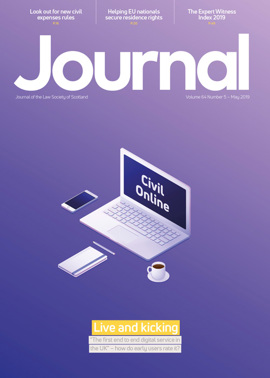Complaints: seeking consistent practice

Did you respond to the Law Society of Scotland’s (LSoS) recent consultation on practice rules B4 and B5?
Issues around client communication and care may not often be in the spotlight (apart from the recent work by Lockton, highlighting the link between good complaint recording and managing claims risk). However, in the current debate on reform of legal services regulation and complaints, hopefully we can all agree on the need for a system that effectively encourages learning and improvement. The good news is that sometimes this can be driven by individual firms, with regulatory support.
We saw a while ago that there was a real opportunity to support improvement in client care, and have been in discussions with LSoS for a few years about changes to the practice rules. We are pleased that we have come some way, but the changes currently proposed could go further. Two years ago we undertook a small “desk research” project on the availability and content of firms’ complaint records, in light of rule 5.5.1, which requires firms to maintain a central complaints log. We wanted to examine a cross-section of complaints records, to see if there were any significant trends or best practice worth sharing.
Of the firms we contacted:
- five did not respond;
- two declined to take part;
- eight wanted to take part but didn’t feel they could;
- five responded and sent complaint record extracts.
We obtained some useful feedback, even from those who didn’t feel they could take part. This highlighted certain barriers, including: client confidentiality and/or commercially sensitive information; reluctance of the firm’s risk management team; and insufficient resources to extract the information.
For us, this highlighted a tension in the rules, that although firms are required to keep a central record, there is no duty to share this with us or LSoS. There is little or no guidance to assist client relations managers in keeping those records, what they should be used for, and how to react when asked to provide the log to the appropriate regulatory body.
From the logs we did see, there was a clear lack of consistency in record keeping, including the extent and comprehensiveness of data recorded: one firm simply provided a narrative paragraph for each complaint received; another failed to detail the type of work that led to the complaint. One firm indicated that as they had never received a complaint, they did not hold a complaints record. It also became apparent that there may be a lack of understanding of what constitutes “first-tier” resolution. One described a complaint which had been resolved by a SLCC case investigator as having been resolved at first-tier. Our view is that first-tier relates to the firm’s handling of the complaint, before it has come to the SLCC (and also complaints returned by the SLCC as “premature”, for the firm to consider). From our analysis, we spotted a clear opportunity to remedy some of the inadequacies in the rules around complaints recording, while supporting client relations managers (CRMs) in dealing effectively with complaints at “first-tier”. We passed our findings to LSoS, with three recommendations:
- Revise rule B5, to make it compulsory for those appointed CRMs to undertake a minimum of two hours’ CPD in complaint handling/complaint prevention best practice every
- two years.
- Revise rule B5.5.1, to make it compulsory for firms to make available to the SLCC, on request, anonymised complaint related data.
- Revise rule B5.5.1, to make it compulsory for firms to include a minimum number of specified data fields in their complaints records.
We also highlighted a further six changes which we felt would improve complaints handling. We were pleased when a consultation on these issues was underway this year. In our response, we agreed on many issues, and again proposed some further changes and reflections for LSoS. In brief:
We welcomed the requirement for firms to tell clients of their right to complain to the SLCC.
We agreed with the improved requirements for recording complaints data, emphasising the importance of the inclusion of a space for learning from complaints. This is vital to support firms to improve client care.
Unlike a consultation in 2017, LSoS is now proposing that it alone should have access to complaints records. Our view is that we would be better placed to request and receive complaint information, in keeping with our statutory duties to monitor trends and issue guidance on complaint handling (Legal Profession and Legal Aid (Scotland) Act 2007, ss 33, 35, 36 and 40). (We also highlighted the potential conflict with the duty on LSoS under these provisions to refer “expressions of dissatisfaction” to us as the gateway for complaints.)
We welcomed greater recognition of third party complaints and clarity on firms’ responsibilities regarding them. We suggested that firms should have a separate procedure for dealing with these.
We hope our observations will lead to further useful discussion within LSoS, before changes to the rules are finalised and implemented. We believe that we can, collectively, still realise the opportunity for improvement in complaints handling, recording and learning here.
The SLCC’s response is in the resources section of www.scottishlegalcomplaints.org.uk
In this issue
- Claiming under the advance payment scheme
- Time for a written constitution
- New form F9: worth the wait?
- Wedded to a matrimonial property regime
- Brexit divorce set to increase UK's “skype families”
- Corporate personality: Justice v Doctrine
- Reading for pleasure
- The Law Society of Scotland Expert Witness Index 2019
- Opinion: Judith Robertson
- Book reviews
- Profile: Michael Clancy
- President's column
- Is your legal data being held to ransom?
- People on the move
- Sign up – log in – action!
- Frozen out?
- Taxing times for litigators
- DNA analysis: when research just isn’t enough
- Brexit focus: EU citizen settlement remedies
- Why employers should report on wellbeing
- 3% – and then what?
- 1,000 days of mediation
- Barred from acting
- To name or not to name?
- Enter the “What I Think”
- Fixed penalties and fair trials
- Auto-enrolment: keeping employers on their toes
- Scottish Solicitors' Discipline Tribunal
- Vulnerable accused: a need for knowledge
- Burdens and who can enforce them
- Convener’s final bow
- Public policy highlights
- TCSP review update
- Westminster: answering the call
- Accredited paralegal practice area highlight: family law
- Accredited Paralegal Committee profile
- Nyona named star paralegal
- Ask Ash
- Moving nightmares part 2
- Complaints: seeking consistent practice
- Morally bankrupt?
- For the elderly: how SFE works
- Standing up to challenge






